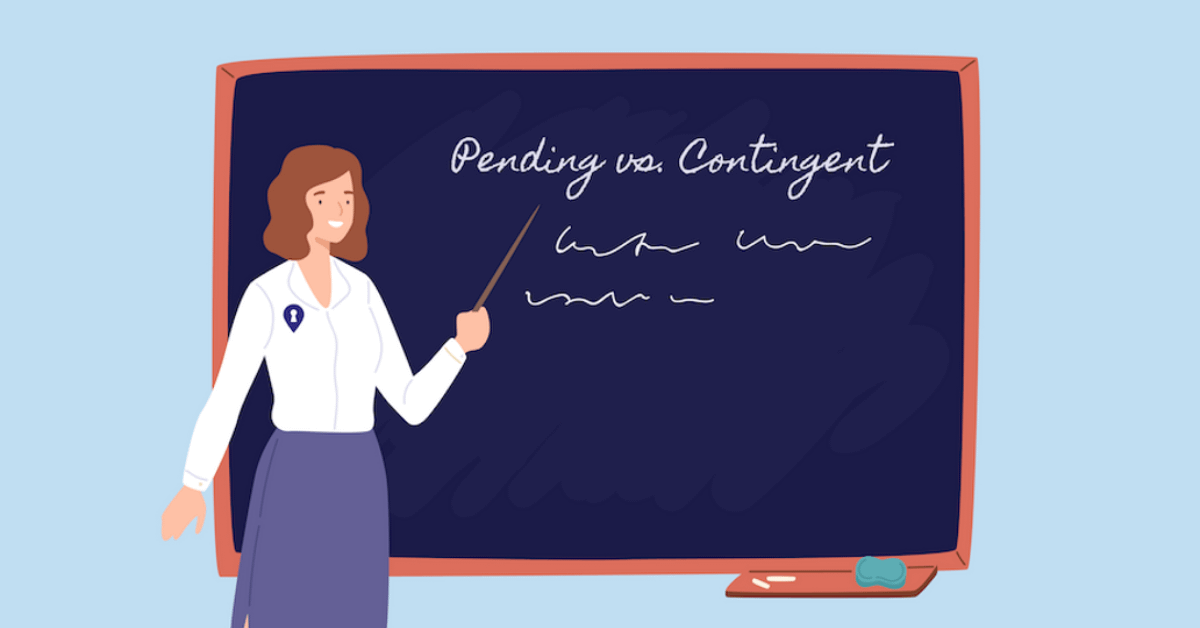At last… you found your dream home! It’s everything you were looking for in a new home! It’s the perfect size with a big yard in a fantastic location… everything you wanted!
Wait… there’s a small sign that says “pending” on the for sale sign. Oh no!… does this mean that your dreams of owning this house are crushed?
It’s possible… but you might still have a chance.
Orlando real estate deals fall through every day for one reason or another. So as Lenny Kravitz would say… “It ain’t over till it’s over”.
If you’ve been looking at real estate listings, you’ve noticed there are a few different statuses. In this post we’ll be comparing contingent vs pending, so you’ll know exactly what they mean to you as the buyer. So, the question is… Can you still make an offer on a home under these conditions and what are your chances?
A Real Estate Contingency

Once a property goes under contract, the seller and buyer have made a promise to go through with the sale. For instance, If a house goes under contract, the seller can’t accept any other offers or sign another contract. The seller has to adhere to the terms of the contract. Typically, a buyer puts down an earnest money deposit to show that they’re serious. If they walk away from the deal for no reason, the seller gets to keep the deposit.
So what if something happens during the process that makes one of the parties want to walk from the deal?
It’s exactly for this reason that real estate contingencies exist. Both seller and buyer are free to add contingencies to any real estate contract. A contingency means the sale of the home is contingent on a specific condition. If that condition isn’t fulfilled, the buyer or seller isn’t obligated to continue with the sale.
What Are Some Common Contingencies?
- Home Inspection- Buyers hardly ever request a home inspection before submitting an offer. That’s why the most common contingency is the home inspection contingency. So what if something negative comes up in the inspection report? Either the parties will negotiate the repairs or cost of repairs and adjust the price. If the issues are bigger than the buyer wants to handle, they can walk away from the deal and get their deposit back… all thanks to the inspection contingency.
- Appraisal- An appraisal is always a nerve-wracking part of a real estate transaction. The buyer’s mortgage company orders an appraisal to know the true value of the home. They want to make sure if the buyer defaults, they can retake possession of it and recover their investment. The appraisal is generally based on the market value of a home. The appraiser should make adjustments depending on upgrades and needed repairs. If the home doesn’t appraise for the contract price then the lender will deny the loan. In this scenario, the buyer can walk and collect their deposit.
- Financing Contingency- Also designed to protect the buyer is the financing contingency. Besides the appraisal, there are a few other reasons the lender may deny a loan. For whatever reason… if the lender denies the loan, the buyer is free from the contract and can collect their deposit.
- Home Sale Contingency- A buyer can have a contingency that allows them to sell their current home before buying. Buyers usually do this if they need the money from that sale for the down payment of the new home.
What Does Pending Mean?

Once all the contingencies of the contract are met, the listing status changes to pending. A pending listing is no longer considered to be an active listing. It means the sale hasn’t closed yet but is scheduled to.
Although, this doesn’t necessarily mean buyers can’t make an offer…
Pending — Accepting Backups
This means the seller is taking backup offers in case the one they have falls through. It’s important to note the seller can’t accept any other offer until the first one falls apart. Buyers can have their real estate agent follow up to see how it played out.
Short Sale
A short sale is a condition when a home is being sold at an amount less than what is currently owed on the mortgage. In a short sale scenario, the lender has the final say whether an offer gets accepted or not. Every offer has to be approved by the lender before getting accepted.
You should know going in that short sales are anything but short. Most banks are slow to respond. If you need to buy a house fast then short sales are not for you (especially as a backup buyer). However, if you’re in a position where you can wait a month or two…or three to buy, then you could end up with a great deal… if the previous buyer falls through.
Real Estate Terms: Contingent vs Pending
You should now understand the difference between contingent vs pending status on a listing. I hope these real estate statuses are less confusing to you when the time comes.
If you like a home, go ahead and put an offer on it… even if it’s pending. Orlando real estate deals fall through all the time and you might just get lucky! You’ll never know if you don’t try.
If you still have questions regarding this post or anything else related to real estate contact me today! I’m happy to help!


